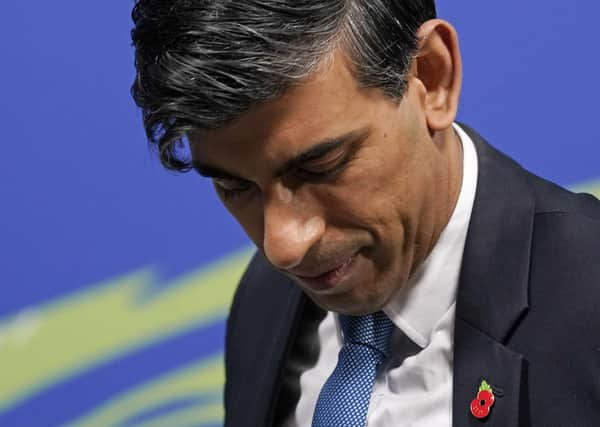Rishi Sunak's attitude to COP27 doesn't inspire confidence - Richard Dixon


This would have been embarrassing because the UK are still the COP hosts, managing the transition to Sharm El Sheikh with the Egyptian government. The backlash prompted yesterday’s u-turn.
Labour and the LibDems were critical of the original decision not to go and the Scottish Government used the moment to confirm that Nicola Sturgeon is going to go to COP27.
Advertisement
Hide AdAdvertisement
Hide AdAlok Sharma, Tory MP and current COP president, was also critical. Perhaps emboldened by his demotion so that he and Climate Minister Graham Stuart no longer get to automatically attend Cabinet Meetings, Sharma said Sunak was risking putting the Tory’s green credentials at risk.
Thérèse Coffey, the new Environment Secretary was wheeled out to defend this decision in media interviews, calling COP27 ‘just a gathering of people in Egypt.’ More than 90 heads of states are expected to attend the talks, including US President Biden.
The backlash prompted some rowing back, with No.10 at first saying Mr Sunak would like to go, if his diary allows and yesterday saying he would go.
Sturgeon is not only a regular attender at UN climate talks she is also the chair for Europe of the Under 2 Coalition, which is a big global network of states and regions committed to reaching net zero by 2050 or sooner.
Is it actually important for world leaders to attend the climate talks? Yes it is, because the negotiating officials, liaising with their capitals can only go so far. If world leaders turn up for the second week they can actually break the log-jams and get important things agreed.
In 2009 in Copenhagen expectations were high that there would be a new global deal done to tackle climate change. World leaders turned up in the second week of the conference to find that nothing useful had been achieved in the first week. At one point Barack Obama and other world leaders were huddled around Russia’s President Medvedev as he typed out what became the Copenhagen Accord on his laptop, so they could all go home saying they had done something useful. In many ways this was a weak document but it advanced two important issues – aiming to keep temperature rise below 2ºC and committing $100bn a year to help less-wealthy countries.
It was only because world leaders were together in Copenhagen that these advances could happen. (It would be perhaps a little mean to mention that, 13 years on, neither of these goals is on track).
Attending or not attending COP27 sends a strong signal about how seriously Rishi Sunak and his government take climate change and his u-turn doesn’t inspire confidence.Dr Richard Dixon is an environmental campaigner and consultant